烷烃基的类别
问题描述
化学很神奇,以下是烷烃基。
| Name |
HDMG |
Name |
HDMG |
| n-hexane |
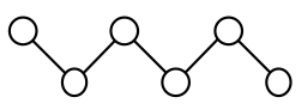 |
2-methylpentane |
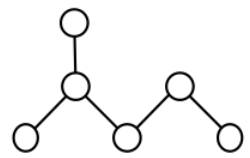 |
| 3-methylpentane |
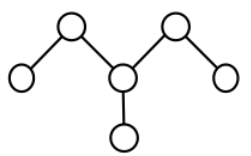 |
2,3-dimethylbutane |
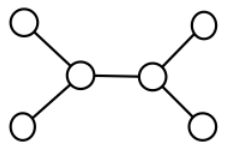 |
| 2,2-dimethylbutane |
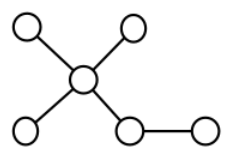 |
- |
- |
假设如上图,这个烷烃基有6个原子和5个化学键,6个原子分别标号1~6,然后用一对数字 a,b 表示原子a和原子b间有一个化学键。这样通过5行a,b可以描述一个烷烃基
你的任务是甄别烷烃基的类别。
原子没有编号方法,比如
1 2
2 3
3 4
4 5
5 6
和
1 3
2 3
2 4
4 5
5 6
是同一种,本质上就是一条链,编号其实是没有关系的,可以在纸上画画就懂了
输入第一行为数据的组数 T (1 ≤ T ≤ 200000)。
每组数据有5行,每行是两个整数 a, b (1 ≤ a,b ≤ 6, a ≤ b)
数据保证,输入的烷烃基是以上5种之一
|
Output
Example
Input:
2
1 2
2 3
3 4
4 5
5 6
1 4
2 3
3 4
4 5
5 6
Output:
n-hexane
3-methylpentane
|
解题思路
对烷烃基标号
对于每一个标号可以用数组标号+1表示,其连接的其他碳原子标号-1用链表储存。
对于上述5种烷烃基,可以得到如下邻接链表结构:
| Name | HDMG | Structure |
| ————————— | ——————————— | —————————————————————————————— |
| n-hexane |  |
| [1]→2
[2]→1→3
[3]→2→4
[4]→3→5
[5]→4→6
[6]→5 |
| 2-methylpentane | 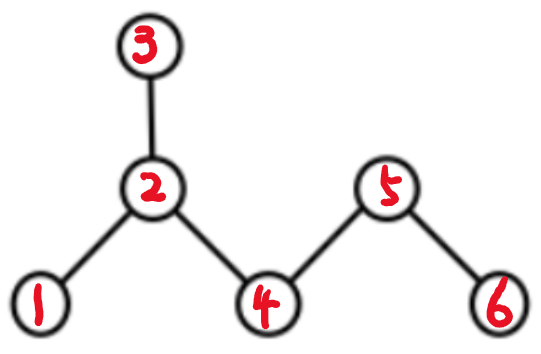 |
| [1]→2
[2]→1→3→4
[3]→2
[4]→2→5
[5]→4→6
[6]→5 |
| 3-methylpentane | 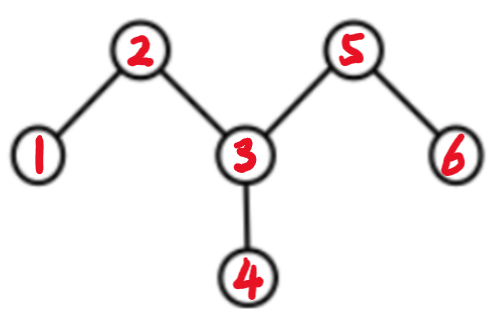 |
| [1]→2
[2]→1→3
[3]→2→4→5
[4]→3
[5]→3→6
[6]→5 |
| 2,3-dimethylbutane | 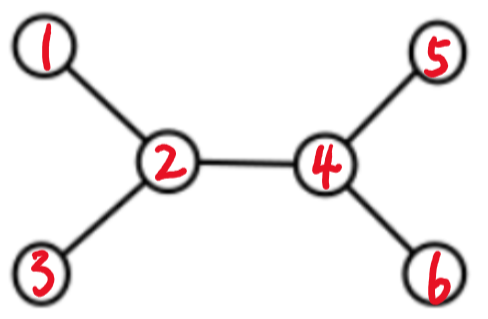 |
| [1]→2
[2]→1→3→4
[3]→2
[4]→2→5→6
[5]→4
[6]→4 |
| 2,2-dimethylbutane | 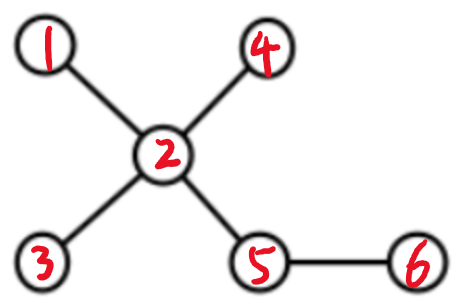 |
| [1]→2
[2]→1→3→4→5
[3]→2
[4]→2
[5]→2→6
[6]→5 |
初次鉴别
标号不管怎么变都无法影响烷烃基的种类,但是观察邻接链表,不难发现链长可以进行初次区分。
| 正己烷 | 2-甲基苯丙烷 | 3-甲基苯丙烷 | 2,3-二甲基丁烷 | 2,2-二甲基丁烷 |
| :——: | :—————: | :—————: | :——————: | :——————: |
| 1 | 1 | 1 | 1 | 1 |
| 2 | 3 | 2 | 3 | 4 |
| 2 | 1 | 3 | 1 | 1 |
| 2 | 2 | 1 | 3 | 1 |
| 2 | 2 | 2 | 1 | 2 |
| 1 | 1 | 1 | 1 | 1 |
可以设3个int变量count2, count3, count4用来记录链长 = x的出现次数。
只有2,2-dimethylbutane的count4 = 1;
只有n-hexane的count2 = 4;
只有2,3-dimethylbutane的count3 = 2;
对于2-methylpentane和3-methylpentane,count2 = 2, count3 = 1, count4 = 0,无法通过链长来区分。
- 鉴别2-methylpentane和3-methylpentane
不难发现,不管怎么编号(正/反),当链长 = 3时,与这个碳原子相连的甲基个数不同。因此可记录链长 = 3时数组编号no,然后找到此数组所在的链arr[no],记录该条链储存的元素,即记录与之相连的碳原子的编号。
比如图中2-methylpentane与2相连的是1, 3, 4,属于甲基(即链长 = 1)的是1, 3;
3-methylpentane与3相连的是2, 4, 5,属于甲基的是4。
2-methylpentane的甲基个数为2,3-methylpentane的甲基个数为1,以此鉴别。
数据结构及实现方法
采用邻接链表表示的有向图,本题只需提供插入、查找、遍历操作。详见源代码注释。
源代码
#include <iostream>
#include <string>
#include <vector>
using namespace std;
struct node {
int a;
node* next;
node() { a = 0; next = NULL; }
node(const int& a) { this->a = a; next = NULL; }
node(const int& a, node* next) {
this->a = a; this->next = next;
}
};
class chain {
protected:
node* firstNode;
int listSize;
public:
chain(int initialCapacity = 10) {
firstNode = NULL;
listSize = 0;
}
chain(const chain&);
~chain() {
while (firstNode != NULL) {
node* nextNode = firstNode->next;
delete firstNode;
firstNode = nextNode;
}
}
int getSize() { return listSize; }
void insert(const int& theElement) {
if (firstNode == NULL)
firstNode = new node(theElement, firstNode);
else {
node* p = firstNode;
node* pp = NULL;
while (p != NULL && p->a < theElement) {
pp = p;
p = p->next;
}
node* newNode = new node(theElement, p);
if (pp == NULL)
firstNode = newNode;
else
pp->next = newNode;
}
listSize++;
}
int indexOf(const int& theElement) const {
node* currentNode = firstNode;
int index = 0;
while (currentNode != NULL && currentNode->a != theElement) {
currentNode = currentNode->next;
index++;
}
if (currentNode == NULL)
return -1;
else
return index;
}
vector<int> getElement() {
vector<int> nei;
node *p = firstNode;
while (p != NULL) {
nei.push_back(p->a);
p = p->next;
}
return nei;
}
};
class ane {
private:
chain arr[6];
int chainSize[6];
public:
ane(){ }
~ane(){ }
void insert(int a, int b) {
if (arr[a].indexOf(b) == -1) {
arr[a].insert(b);
}
}
void getSize() {
for (int i = 0; i < 6; i++) {
chainSize[i] = arr[i].getSize();
}
}
string type() {
int count2 = 0, count3 = 0, count4 = 0;
for (int i = 0; i < 6; i++) {
if (chainSize[i] == 2)
count2++;
if (chainSize[i] == 3)
count3++;
if (chainSize[i] == 4)
count4++;
}
if (count2 == 4)
return "n-hexane";
if (count4 == 1)
return "2,2-dimethylbutane";
if (count3 == 2)
return "2,3-dimethylbutane";
else if (count2 == 2 && count3 == 1 && count4 == 0) {
int no = 0;
for (int i = 0; i < 6; i++)
if (chainSize[i] == 3)
no = i;
vector<int> nei = arr[no].getElement();
int count1 = 0;
for (int i = 0; i != nei.size(); i++)
if (chainSize[nei.at(i)] == 1)
count1++;
if (count1 == 2)
return "2-methylpentane";
else
return "3-methylpentane";
}
}
};
int main() {
int n;
cin >> n;
for (int i = 0; i < n; i++) {
ane tane;
for (int j = 0; j < 5; j++) {
int a, b;
cin >> a >> b;
tane.insert(a - 1, b - 1);
tane.insert(b - 1, a - 1);
}
tane.getSize();
cout << tane.type() << endl;
}
return 0;
}
|





 |
|  |
|  |
|  |
|  |
|